The shocking appropriation of a grandmother's death
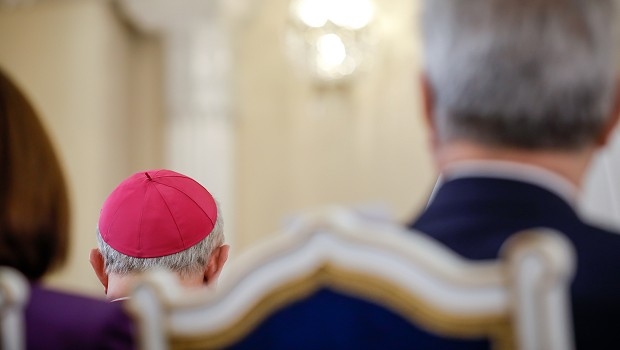
A friend pointed out to me an opinion piece published this week in MercatorNet that slams Victoria's voluntary assisted dying (VAD) law. Written about an elderly woman with cancer who used the law to die peacefully, it's an angry diatribe written by the woman’s granddaughter-in-law: one Mrs Madeleine Dugdale.
Update 21-Sep-2020
Mrs Madeleine Dugdale's article has been withdrawn from MercatorNet without explanation. Here's a screenshot of the original.
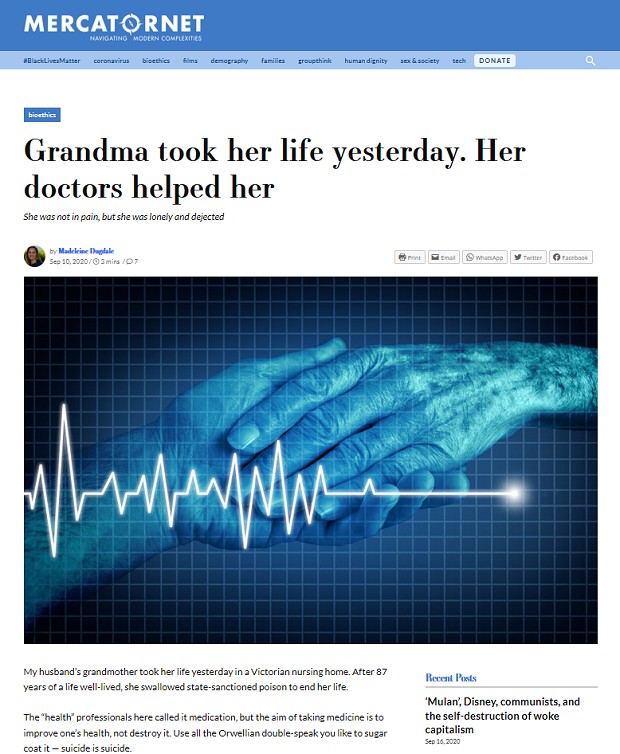
And this is Mrs Dougdale's "about" page after the article was withdrawn.
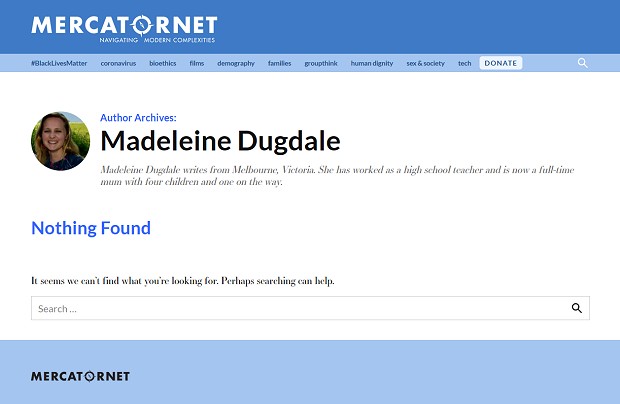
While it's far from my preferred practice to take on someone recently bereaved, Mrs Dugdale has put herself and her family firmly in the public square by publishing an editorial about her grandmother's death (actually her husband’s gran) the very day after she died.
All is not as it seems and a response is required.
Catholic talking points
Let's not beat about the bush: Mrs Dugdale's piece is a grotesque misrepresentation of Victoria's VAD law and relies on gallingly distorted framing. Despite not mentioning faith, religion or Catholicism, her opinion piece ticks most Catholic talking-point boxes I've pointed out previously, such as Mrs Dugdale’s:
- Headlining that her gran was not in particular pain. We already know from extensive overseas experience that pain is a less common reason behind why people consider VAD.
- Being sure to emphasise the death was a suicide, and that "suicide is not courageous, it's an horrendous act of desperation and defeat".
- Linking it to loneliness caused by Covid-19 lockdown.
- Shabbily inferring that doctors did not discuss and offer all and anything palliative care could bring to bear, when there's a consultation process mandated by law.
- Suggesting that palliative care could alleviate all intolerable suffering, but which both palliative care peak bodies in Australia concede is not possible.
- Scandalously implying that medical care workers were forced to participate in her assisted death against their will, when the law protects anyone who wishes to decline.
- Suggesting her gran's choice was an issue of mental health, implying that she wasn't fit to decide, when in fact doctors must confirm decisional capacity.
- Describing the process as "obfuscation and secrecy" when a strong chain of documentary evidence is mandated, while no process is mandated for the Catholic church's own accepted patient path to foreseeable death: refusal of life-saving medical treatment.
Mrs Dugdale employs no fewer than eight Catholic church talking points in her attack on Victoria's VAD law.
Spurned "help"
Also of note is Mrs Dugdale's description that she and her husband were "silenced" and "quickly shut down" so there was "little my husband and I could do to help." Did the family actually want help of the kind Mrs Dugdale and her husband were determined to dispense?
One wonders what Mrs Dugdale's gran would think if she could see how a granddaughter-in-law had sought to weaponise her choice for VAD, against the law itself.
Update 24-Sep-2020
We now know what gran's immediate family thought of Madelein Dugdale's savage misrepresentation of their mum's death. It's not pretty, and they've asked Madeleine for a written apology. Read the full story at Go Gentle Australia.
Who is Madelaine Dugdale?
So who is Mrs Madelaine Dugdale? Her article bio reports only that she's a former Melbourne high school teacher and now a full-time mum of four with one on the way. Move along, nothing to see here…
Well, it’s worth looking a bit more carefully, elsewhere. Mrs Dugdale graduated from (Catholic) Campion College. And that high school where she worked? St Kevin’s (Catholic) College in Toorak, Melbourne, where she taught… religion.
She's a leading member of Catholic Voices Australia, whose purpose is "putting the Church's case in the public square."
So in summary, this anti-VAD diatribe bristling with Catholic church misinformation was penned by a leading member of Catholic Voices Australia whose remit is "putting the Church's case in the public square", but which failed to identify that religious connection and attempted to give the appearance of secular impartiality.
If there's any remaining doubt about Mrs Dugdale's Catholic devotion, here she is discussing the Pope's amoris laetetia (the joy of love) book with Fr Tony Kerin, an Episcopal Vicar for Life, Marriage and Family in Melbourne.
Hidden religious petticoats indeed.
And who is the publisher?
Mrs Dugdale's anti-VAD tirade is published online by the masthead MercatorNet. It declares itself to be "dignitarian", and reveals that its Editor is a Catholic who believes in God. The masthead is named after Gerardus Mercator, the C16th cradle Catholic cartographer.
MercatorNet's About webpage opines that "religion adds clarity and conviction to the task of defending human dignity" — as if that's an exclusive province or even necessary feature of "religion" — and insists that arguments it publishes are "based on universally accepted moral principles, common sense and evidence, not faith."
Pfft.
Another invitation to "dig here"
Methinks they doth protest too much. It doesn't take much effort to peel back the veneer of neutrality.
MercatorNet is a trading name of the company New Media Foundation Ltd. (For reference, another of its trading names is BioEdge, which has the same Editor as MercatorNet, but we'll get to that later.) It's a company limited by guarantee; a registered charity established in 2005 and based in NSW.
Oddly, its 2019 ACNC records claim 2 full-time and 10 casual employees for a full-time equivalent (FTE) of 5. However, their total payroll expenditure as lodged, "Editor fees", was less than $38k. But If FTE is 5, then that's an average of just $7,600 per full-time annum. A minimum wage of $16/h over a year, without holiday leave, would equate to around $27k per person, times 5 would make a total minimum lawful payroll budget of $135k per annum. Hmmm.
Other major expenses were website maintenance and hosting ($26k), paying contributors ($18k), and insurance ($4k).
The company's bare-bones website mysteriously states only that its mission is "to help people navigate modern complexities in a way that respects the fullness of human dignity."
Of its masthead MercatorNet, the company’s website says only that the outlet is "dignitarian" and "doesn't want to be trapped on one or the other side of the culture wars". Of its BioEdge masthead it says that it's "completely independent".
Double pfft.
Who controls the company?
According to ASIC's records, the four registered Directors of New Media Foundation Ltd are Romano and Francine Pirola, Jude Hennessy and Michael Cook. Romano Pirola is the Chairperson, yet it is Michael Cook and Jude Hennessy who signed off the company's latest financial statements. Who are these people?
Romano Pirola and his wife Mavis were Joint Chairs of the Australian Catholic Marriage and Family Council, which advises the Australian Catholic Bishops Conference. They were appointed by the Pope in 2014 as one of just 14 married couples worldwide to participate in the Extraordinary Synod of Bishops on the Family. They've been awarded the church's honour of Knight and Dame of the order of St Gregory for services to the Church, and in 2016 were awarded honorary doctorates by Australian Catholic University.
Francine Pirola is the wife of Byron Pirola, Romano and Mavis Pirola's son. Francine and Byron were awarded honours by Pope Francis in 2019, are directors of the Catholic Marriage Resource Centre (which, incidentally, acknowledges that Catholic wedding numbers have been falling for 25 years) and were joint Chairs (like Byron's parents before them) of the Australian Catholic Marriage and Family Council. They've even represented the Australian Catholic Bishops at meetings of the Pontifical Council of the Family.
They're also the couple whose investment company loaned anti-marriage-equality lobby group Marriage Alliance $1.67m in support of anti-LGBTI flyers handed out to children on school buses. The Crikey exposé makes further interesting reading.
Jude Hennesy is director of the Confraternity of Christian Doctrine for the Catholic Diocese of Wollongong. It's responsible for "special religious education" in state schools.
Michael Cook is Editor of both MercatorNet and BioEdge. He's been a member of the devout lay Catholic group, Opus Dei for more than four decades. Unlike MercatorNet's About page, BioEdge's own About page doesn't mention religious links of any kind, and says it's "completely independent".
All four directors of MercatorNet's controlling company are very deeply and strongly invested in the Catholic church. One of them, Michael Cook, is its Editor.
MercatorNet's remit
Back in October 2016 I did a keyword breakdown of articles published by MercatorNet. In the then 11 years of its existence, assuming no articles were taken down, it had published more than 2,000 articles containing the word "Catholic". That's a lot for a small outlet: an average of 3.5 "Catholic" articles a week, every week, for 11 years.
In comparison, there were no articles containing the word "Anglican", and just 51 containing the expression "Church of England". There were also 121 mentioning "Hindu", and 868 mentioning "Islam", with many of those negative.
New Media Foundation Ltd's ACNC record indicates its qualifying charitable purpose is "advancing education". But publishing thousands of articles mentioning religion, most of them Catholic, would seem to more fully reflect the qualifying charitable purpose of "advancing religion". But they chose "advancing education" instead — which bypasses any mention of religion.
Tellingly, every visit to and search on the MercatorNet website currently results in a pop-up that invites you to join their "influential community of truth-tellers" to "push back against post-modern relativism". That "relativism" is a pet peeve (and language) of the Catholic church.
 MercatorNet attacks post-modern relativism: a pet peeve of the Catholic church, to be countered by "truth-tellers".
MercatorNet attacks post-modern relativism: a pet peeve of the Catholic church, to be countered by "truth-tellers".
MercatorNet headlines the Catholic church's pet peeve: post-modern relativism. This is hardly surprising given its controlling company is run by Opus Dei members, Catholic church staff, and church honours recipients.
The founding of New Media Foundation Ltd
When it was founded in 2005, New Media Foundation Ltd's registered address was 296 Drummond Street, Carlton, Victoria. Significant? Decide for yourself.
That's the address of the Drummond Study Centre. And its connection? "Spiritual activities in the centre are entrusted to Opus Dei, a personal prelature of the Catholic Church." Notice how the centre's name doesn't mention "Catholic" or even religion in any way, either. You have to delve through its web pages to find out.
Previous directors
Similarly, the list of former New Media Foundation Ltd company directors adds to its storyline.
One is Mr Richard Vella, who is or was the spokesperson for Opus Dei in Australia. He describes his personal relationship with God as "the greatest love of my life". Another is Fr Phillip Elias, who was ordained into Opus Dei in Rome in 2017.
Another founding director was Fr Amin Abboud, who died in 2013 and was given a full requiem mass funeral at St Mary's Cathedral in Sydney, presided over by church officials including Monsignor Victor Martinez, the then Regional Vicar of Opus Dei for Australia and New Zealand.
Yet another is Carolyn Moynihan, Deputy Editor of MercatorNet and frequent contributor to Crisis Magazine, "a voice for faithful Catholic laity" and a contributor to the Catholic Exchange. She rails repeatedly against the harms of marriage equality.
Get the picture?
New Media Foundation Ltd and its masthead MercatorNet's Catholic underpinnings are deep and strong.
The roots of the garden
But if you think it might simply be a small bunch of enthusiastic individuals, think again. This veritable garden of fertile Catholic plants arose from somewhere.
Where might that be? I've already pointed out seeding strategies for non-clerical commentary promoted by the Catholic Archbishop of Sydney, Anthony Fisher. It's also worth pointing out that, like any other major institution that seeks to influence public policy, the Catholic church in Australia maintains a whole media and communications department.
Further, the Australian Catholic Media Council hosted the triennial Australian Catholic Communications Congress in 2018, which notably for the first time ever was held together with the Australasian Catholic Press Association (ACPA) Conference. ACPA's brief is to "give voice to Catholic perspectives on the issues of our societies". Former Vatican journalist Greg Erlandson delivered the keynote address to the joint conference, and masterclasses were held to "hone particular skills".
Not a recent phenomenon
If you think this just a recent phenomenon you'd be mistaken. Back issues of the Vatican's own newspaper, L'Osservatore Romano, prove most enlightening.
At least as far back as the eighties, through the nineties and the noughties, the Vatican has been vigorous in its promotion of media engagement across Europe, Asia/Pacific and the Americas. For example, in March 1990 Pope John Paul II noted "unprecedented opportunities" to proclaim the word of God via media channels in central and eastern Europe.
In the same year, Archbishop John Foley, then President of the Pontifical Council for Social Communications, told media workers at a Catholic world congress not to "falsely" compartmentalise their lives into private piety versus professional work subjected to commercial pressure, but instead spread Catholic "truth". He also schooled filmmakers amongst the gathering that "great films are 'at least implicitly religious'".
The Vatican and its 'authorities' repeatedly cajole Catholics into "truth-telling", which means evangelising the church's stances.
Ongoing evangelisation focus
Pope John Paul II repeated his firm wish for more mass media coverage in a major address in 1992, and a follow-on note in the same year encouraged USA Catholic journalists to "put their professional skills at the service of the Gospel".
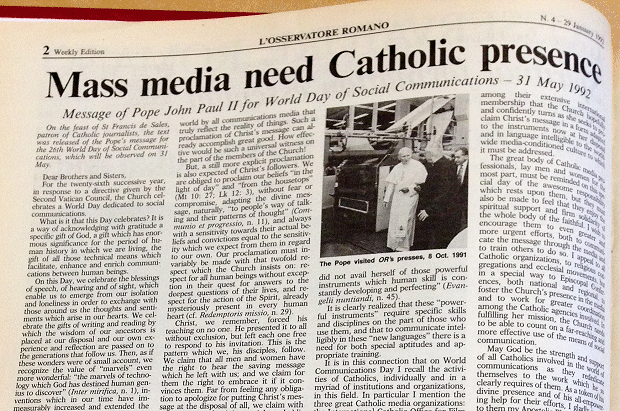 The Catholic church believes the mass media needs a Catholic presence.
The Catholic church believes the mass media needs a Catholic presence.
In another example in 1993 Pope John Paul II emphasised how new media — then videotapes and audiocassettes — could serve the "new evangelisation". And in 2002, he again implored Catholics to adopt the latest new media — the Internet — in "proclaiming the Gospel". Two years later MercatorNet was launched online, as were other similar sites.
And if there was any doubt as to what Catholic communications services were for, in October 2012, Pope Benedict XVI delivered a major address confirming that "the church exists to evangelise".
That's just a few of the many.
Media for the faithful
Back in Australia, B. A. Santamaria established the AD2000 journal in the late 1980s. It's an obviously Catholic publication published by the Thomas Moore Centre in Melbourne. A quality journal aimed squarely at and informative to Catholic adherents, it is of limited interest to the general public. What reaches the general public is mainstream media.
But "Houston, we have a problem"...
Mainstream media a "problem"
In a revealing narrative, loyal Catholic Professor Margaret Somerville, now at the (Catholic) University of Notre Dame Australia, laid out the critical importance of the media to the outcome of VAD law reform in her 2001 book Death Talk: The case against euthanasia and physician-assisted suicide (especially see Chapter 19).
In it, she highlights the Catholic communications problem (without mentioning Catholicism), railing against what she claimed even then was the mostly "small-l liberal" mainstream media as resistant to religious messages. She confirmed that religious media are much more accommodating of the "pro-life" world view.
She specifically noted the importance of "framing" the issues to "significantly influence political decisions", complaining that "anti-euthanasia arguments do not make dramatic and compelling television". She then went on to outline a collection of useful anti-VAD "frames", which were wholly consistent with the Vatican's position and language.
Indeed, you'd be forgiven for thinking Professor Somerville wrote the church's framings, because she's given pre-eminent billing over the Vatican itself in the Catholic Archdiocese of Perth's website for bioethics, the LJ Goody Bioethics Centre. Of further relevance is that the Catholic Archbishop of Perth is, along with the Catholic Archbishop of Sydney, the ultimate authority controlling the University of Notre Dame Australia, where Somerville is a Professor.
(Incidentally, the website's home page "What's new" announcement is more than 5½ years out of date, which gives the impression that the Centre was a hasty, event-specific confection whose purpose has long since passed.)
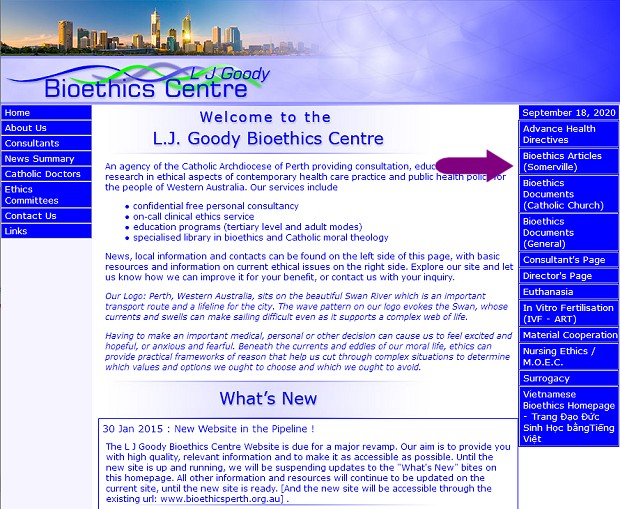 Professor Margaret Somerville gets pre-eminent billing on Catholic bioethics, above the Vatican itself.
Professor Margaret Somerville gets pre-eminent billing on Catholic bioethics, above the Vatican itself.
Don't mention the war religion
Amongst Professor Somerville's numerous writings slamming VAD, some stand out more than others. One that does is a 2008 editorial titled Death talk in a secular age, in which she vigorously encourages religious opponents to "formulate a moral argument against euthanasia without resorting to religion" [my emphasis]. And who published this editorial? Why, it was MercatorNet!
Did the Catholic church take note of Professor Somerville's strategy? As I've pointed out before, Mr Ben Smith, Director of the Life, Marriage and Family Office at the Catholic Archdiocese of Hobart, fails to mention who he really is in at least two purportedly "independent" groups fulminating against Tasmania's current VAD Bill. One of the groups he leads, Live & Die Well, encourages people to write objections to their parliamentarians, but expressly commands "DO NOT use religious arguments."
Professor Somerville was also a keynote speaker at a 2008 conference of media professionals in Toronto, in which she advised journalists and editors how to "frame" the debate against VAD. But these were not just any journalists and editors at large. They were Catholic journalists and editors: members of the Association of Roman Catholic Communicators of Canada, whom she schooled alongside a number of Catholic church officials. The conference's title? "Proclaim it from the rooftops!"
Catholic Professor Margaret Somerville has been central to the Catholic church's hostile "framing" of VAD, and helping media specialists spread that framing through the media.
More religious frustrations
Over the years Professor Somerville continued to build upon the theme, including in her 2015 book, Bird on an Ethics Wire: Battles about values in the culture wars. She escalated her criticism of the "intense tolerance" of "the now ubiquitous moral relativism" as an illustration of how VAD law reform demonstrates what happens "if we take a purely secular approach not balanced by religious views."
A curated garden
You will have noticed by now significant common threads in favour of Catholic "truth"; against "relativism"; calls to evangelise using the media; calls to avoid and actual avoidance of religion in argumentation; avoidance of revealing religious connections in by-lines; and a united portfolio of Church-friendly framings of VAD by a busy theatre of players.
Given the church's perceptions of a hostile mainstream media, is it any wonder that some devout Catholic contributors, and deeply Catholic media outlets, hide their religious petticoats and zucchetti while publishing grave misinformation in the curry of fear, uncertainty and doubt (FUD) against VAD?
This isn't a random jungle.
No, it's a curated garden, tended to by what we might call the 'Catholic communicators guild'.
Failure to mention deep Catholic roots behind purported "secular" attacks on VAD law reform is a strategy of the 'Catholic communicators guild'.
Conclusion
In this review, I've revealed only some of the deep Catholic connections that resulted in a shocking appropriation of the death of an elderly woman with cancer, using misinformation and framing wholly consistent with the Catholic church's evangelisation, but withholding key information about those deep religious underpinnings.
It's clear the Catholic church understands that its religious arguments are unpersuasive to the wider community. It's also important that the public and legislators understand how religious forces attempt to sow fear, uncertainty and doubt about VAD law reform by giving the appearance of secular neutrality to its messages.
Mrs Dugdale’s gran deserved better than to be appropriated for the aggrandisement of an agenda that is clearly at odds with her own beliefs and values… and the values of the overwhelming majority of Australians.
May she rest in peace.
